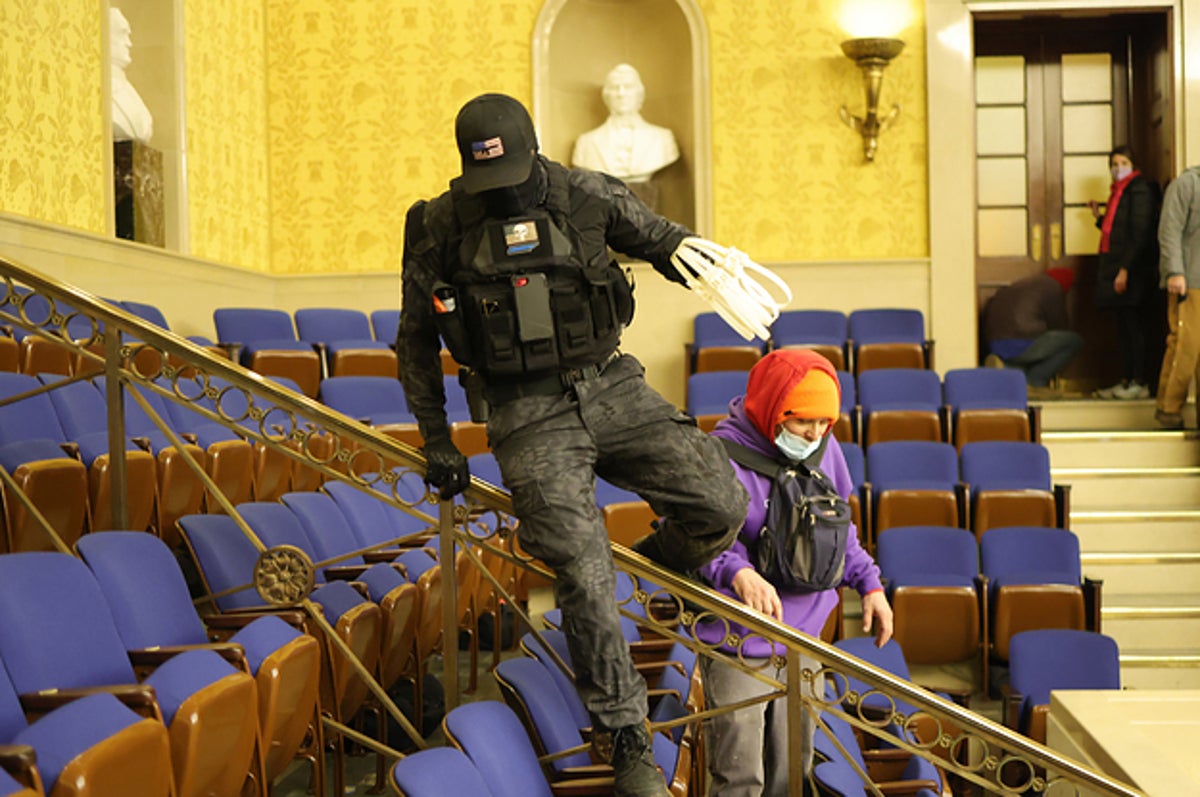
[ad_1]

Win Mcnamee / Getty Images
WASHINGTON — A Tennessee man photographed inside the Capitol on Jan. 6 wearing tactical gear and carrying plastic zip tie handcuffs will be held in jail while his criminal case goes forward, a federal judge in Washington ruled on Wednesday.
In a 17-page opinion, US District Judge Royce Lamberth in Washington, DC, agreed with federal prosecutors that there were no conditions of release for Eric Munchel and his co-defendant and mother Lisa Eisenhart that would “reasonably ensure the safety of the community.” Munchel and Eisenhart pose “a clear danger to our republic,” the judge concluded.
“Given Munchel’s brazen actions in front of hundreds of law enforcement officers and manifest disrespect for the rule of law, the Court is not satisfied that Munchel would comply with any release conditions,” Lamberth wrote. “Munchel has indicated that he would be willing to act against Congress again, and nothing short of pretrial detention can prevent him from doing so.”
The judge described Eisenhart as “a self-avowed, would-be martyr,” noting that after the riot she gave a media interview where she said that she would “rather die as a 57-year-old woman than live under oppression” and “would rather fight.” Lamberth wrote that this was evidence that Eisenhart, like Munchel, was willing to “repeat her behavior” if allowed to go home.
During a court hearing on Wednesday, lawyers for Munchel and Eisenhart had argued before Lamberth that because their clients weren’t charged with assaulting anyone or destroying property, that undermined the government’s argument that they were a danger to the community. But Lamberth wrote that the “portrayal of the alleged offenses as mere trespassing or civil disobedience is both unpersuasive and detached from reality.”
“Storming the Capitol to disrupt the counting of electoral votes is not the akin to a peaceful sit-in,” the judge wrote.
The vast majority of the 200-plus people charged with participating in the insurrection have been allowed to go home while their cases are pending without objection from prosecutors. Judges in these cases typically have imposed travel restrictions and some defendants are on home detention. In a small number of cases, prosecutors have argued for pretrial detention on the grounds that defendants pose a danger to the community or a flight risk; they’ve tended to reserve those requests for cases that involve people accused of assaulting police officers, carrying weapons, planning for violence in advance, or taking any kind of leadership role in the assault on the Capitol.
Munchel was arrested in Tennessee on Jan. 10, four days after the insurrection at the Capitol; Eisenhart was arrested on Jan. 16. Both made their initial court appearances in Tennessee where the government unsuccessfully asked a federal magistrate judge to keep them in custody. Prosecutors raced to the federal court in Washington — where all of the Capitol cases are ultimately being prosecuted — to appeal Munchel and Eisenhart’s release, and a judge agreed to temporarily hold them in jail pending another round of review of the detention issue.
On Feb. 12, a federal grand jury returned an indictment that charged them jointly with three felony counts: obstruction of an official proceeding, entering a restricted building or grounds with a dangerous weapon, and engaging in violent entry or disorderly conduct with a dangerous weapon. According to prosecutors, Munchel was carrying a Taser when he entered the Capitol, and he and Eisenhart could be heard in a video that Munchel recorded that day discussing stashing other weapons outside the Capitol; they’re also accused of picking up US Capitol Police plastic zip tie handcuffs, known as “flexicuffs,” inside the building.
The government’s court papers describe how Munchel’s video captures him and Eisenhart urging on other rioters and helping people climb over a wall in front of the Capitol. At one point, prosecutors say an unidentified person can be heard telling Munchel and Eisenhart as they approach the Capitol, “You guys look like y’all ready to go,” and Munchel replying, “Fucking ready to fuck shit up.”
Prosecutors also noted in the detention memo that when Munchel and Eisenhart came across an unidentified person handing out the flexicuffs from a cabinet, Munchel could be heard in his video saying, “Zip ties! I need to get me some of them motherfuckers.” Prosecutors described the two as part of a mob searching for members of Congress, and argued Munchel grabbed the handcuffs “comprehending that they are instruments of restraint and kidnapping.”
Lamberth heard arguments on Wednesday. Assistant US Attorney Ahmed Baset began his presentation by saying that Munchel and Eisenhart arrived at the Capitol wearing “full combat gear” — Munchel in military fatigues, a tactical vest, and face covering that showed only his eyes, and Eisenhart in a tactical vest. Baset argued that Munchel and Eisenhart not only picked up the plastic handcuffs, but did so “with glee.” Baset also said that Munchel and Eisenhart hadn’t shown remorse after the riot, and he told Lamberth that the government had texts sent via the secure messaging app Signal after Jan. 6 that appeared to show Munchel expressing interest in joining the Proud Boys, a far-right extremist group that has described its members as “Western chauvinists.”
Munchel and Eisenhart are charged together, but have their own lawyers. Munchel’s attorney Sandra Roland argued on Wednesday that the fact that Munchel made arrangements to self-surrender and turn over evidence from his phone showed he wasn’t a flight risk, and noted he didn’t have a history of violence. Both she and Eisenhart’s attorney Gregory Smith focused on the fact that neither defendant was charged with hurting anyone or destroying property, and asked Lamberth to adopt the Tennessee judge’s order releasing the two to home confinement.
“He did not engage in violence. He did not threaten violence. He did not encourage anyone else to engage in violence,” Roland said of Munchel.
Roland argued that Munchel had come to Washington to protest and send a “message,” an argument that prompted Lamberth to jump in and press her to explain why Munchel had picked up the plastic handcuffs once he was inside the Capitol.
“That sends a message, too, doesn’t it?” the judge asked.
Roland argued that the government hadn’t presented evidence about what Munchel’s intent was in carrying the handcuffs, and that, in the end, he didn’t use them.
“Luckily,” Lamberth quipped in response.
Smith accused prosecutors of overselling the evidence of what Munchel and Eisenhart did during the roughly 10 minutes that they were inside the Capitol; he said the Tennessee judge hadn’t agreed that the government supported a claim that Eisenhart chased police officers. He also argued that Lamberth should focus on whether Eisenhart, who didn’t have a previous criminal record, posed a risk to the community going forward, and not on what happened on Jan. 6.
What did the government fear Eisenhart would do, Smith asked, “now that Donald Trump is no longer in office, now that the electoral vote has been confirmed, now that there’s a fence around the Capitol?”
Baset responded to Smith by arguing that the “conditions” that led to the violent assault on the Capitol were “still ever present,” pointing to the National Guard’s presence in Washington and threat assessments related to potential demonstrations in early March. Baset didn’t elaborate on the threat assessments, but Newsweek reported this week that law enforcement officials are monitoring potential activity around March 4, a date of significance for followers of the collective delusion QAnon. He argued that the “extraordinary circumstances” of these cases warranted pretrial detention, saying that Munchel and Eisenhart “felt entitled” to walk into the Capitol while Congress was in session, and that they were “dressed for combat, dressed for violence.”
Munchel’s lawyer noted that he could be heard in a video admonishing other people inside the Capitol to not break anything. Baset argued that giving weight to that argument would be like giving a burglar credit for not breaking a vase.
This is a developing story. Check back for updates and follow BuzzFeed News on Twitter.
[ad_2]
Source link





